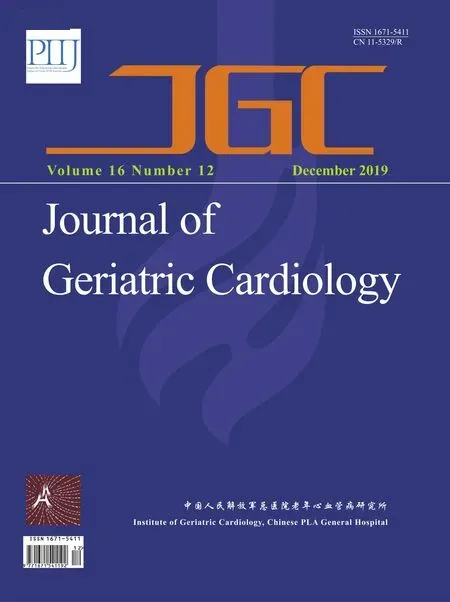Authors’ reply
Mustafa Yener?a?, U?ur Arslan, Güney Erdo?an, Onur Osman ?eker, Osman Can Yontar
Department of Cardiology, University of Health Sciences Samsun Training and Research Hospital, Samsun, Turkey
First of all, we want to thank the journal reader, who was the author reporting the former oldest takotsubo syndrome (TTS) patient, for her/his interest in our case report and constructive contribution to our article entitled “A 99-year old patient with takotsubo cardiomyopathy recovering from cardiogenic shock” published in the Journal of Geriatric Cardiology in 2019.[1]In the guideline entitled “International expert consensus document on takotsubo syndrome: clinical characteristics, diagnostic criteria, and pathophysiology”,[2]it has been stated that an emotional, physical, or combined trigger may precede the takotsubo syndrome event, but this is not obligatory. We could not find an obvious trigger in this patient, however emotional stress due to the Alzhemier’s disease might be a trigger for this patient. As we could not clearly identify a trigger, we thought that our patient has a primary TTS. In her follow-up, no new neurological symptom or disorder (i.e., subarachnoid haemorrhage, stroke/transient ischaemic attack, or seizures) developed. Biochemical measurement of NT-proBNP was not available in our hospital at that time, so we did not report about the BNP levels. As you have already mentioned, there are many controversies regarding about the treatment strategies due to lack of randomised trials. According to our clinical experience, we usually start dual antiplatelet therapy because of the non-critical plaques in the coronary angiogram and stop one of them, which is usually acetyl salicylic acid at the first month and continue with a single antiplatelet therapy (clopidogrel in most cases) for at least one year. Herein, we also gave 40 enoxaparine twice a day for three days to prevent thrombus formation in the large ballooning area. The patient weighed 90 kg and creatinine clearance was measured 70 mL/min, so it seemed to be relatively safe to give enoxaparine treatment despite her very old age.
 Journal of Geriatric Cardiology2019年12期
Journal of Geriatric Cardiology2019年12期
- Journal of Geriatric Cardiology的其它文章
- Quantitative flow ratio and intravascular ultrasound guided percutaneous coronary intervention of left anterior descending lesion concomitant with severe coronary myocardial bridge
- Delayed cardiac tamponade after simultaneous transcatheter atrial septal defect closure and left atrial appendage closure device implantation: a particular case report
- Coarctation of the aorta in twins with severe hypertension
- Risks of incident heart failure with preserved ejection fraction in Chinese patients hospitalized for cardiovascular diseases
- Pacemaker therapy in very elderly patients: survival and prognostic parameters of single center experience
- Irregular surface of carotid atherosclerotic plaque is associated with ischemic stroke: a magnetic resonance imaging study
